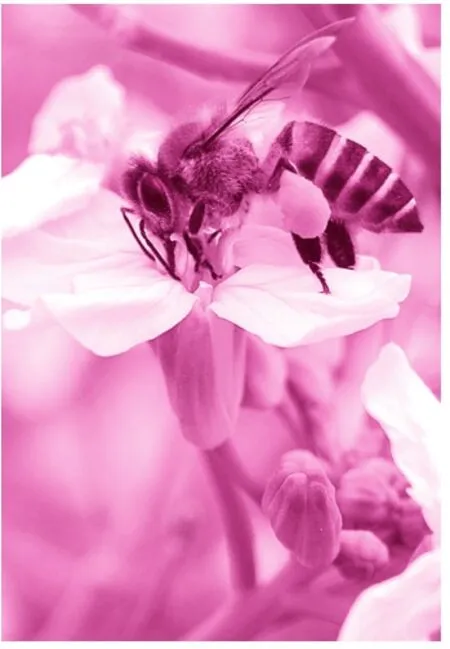一种会完美克隆自己的蜜蜂
河南 刘同功

题材克隆蜜蜂体裁说明文文章词数334难度★★★★建议用时7分钟

A kind of South African honeybees can clone themselves and cre⁃ate more bees like them.Genetic analysis reveals that their cloning hab⁃it began on a single honeybee in 1990 that cloned itself successfully and produced queens that could take over the hive,according toNew Scientist.
The process of asexual reproduction orparthenogenesis(单性生殖)is common in lower plants or animals,like ants,wasps,and bees.However,having an offspring that is identical to the parent is uncommon because genetic material is often mixed up in a process called recombination that could result in an off⁃spring with a slightly different genetic make⁃up.
It was previously known as the subspecies(亚种)of the Cape honeybee that is capa⁃ble of creating a perfect copy of itself,according to Benjamin Oldroyd of the University of Sydney.He added that creating clones that are perfect copies of the parent could be benefi⁃cial as asexual reproduction could often be deadly because one⁃third of the genes become inbred.But since the Cape honeybee workers are perfect clones,they remain genetically healthy as their mother.
“It's incredible.It's also incredibly rare,”Oldroyd told Live Science,referring to the DNA reorganizing method necessary to hold chromosomes(染色体)together during the egg⁃making process of the honeybees that clone themselves.“Yet,somehow they've managed to do it.I've not heard of anything like this before,anywhere”.
The generations of parthenogenetic reproduction have contributed to the loss of genet⁃ic material that led to low levels of genetic diversity that are deadly.Most social insects rely on their queen to reproduce,while workers help maintain the colony and protect the brood(一窝动物).
But in the Cape honeybee's case,workers do not work because they can asexually re⁃produce.Oldroyd said that these bees seemed to develop a rare attitude that leads to the collapse of the hive.He compared it to cells in a tumor in which it does not matter whether the clones are healthy,as long as there is enough of them to exploit the host.
Reading Check
1.What do we know about the underlined word“parthenogenesis”from paragrpah 2?
A.It doesn't exist in living things.
B.It exists only in complex plants.
C.It exists only in simple animals.
D.It's seldom found in higher animals.
2.What's Benjamin Oldroyd's attitude to the cloning of the Cape honeybees at first?
A.Doubtful. B.Concerned.
C.Supportive. D.Ambiguous.
3.What does the underlined word“it”refer to in paragraph 4?
A.Keeping healthy. B.Laying eggs.
C.Reorganizing DNA. D.Producing chromosomes.
4.Which of the following is the result of an insect repeating parthenogenetic reproduction?
A.Its original genetic material becomes less.
B.Its genetic features become more obvious.
C.Its genetic material becomes more diverse.
D.Its chromosomes become simpler gradually.
Language Study
Ⅰ.Theme⁃centered chunks
take over接管;接收
offspringn.后代;幼崽
be identical to与……相同/相似
previouslyadv.事先;以前
contribute to促成;帮助
maintainv.供养
as long as只要
exploitv.开拓;开采;开发
Ⅱ.Difficult sentences in the text
1.Genetic analysis reveals that their cloning habit began on a single honeybee in 1990 that cloned itself successfully and produced queens that could take over the hive,ac⁃cording toNew Scientist.据《新科学家》报道,基因分析显示,它们的克隆习惯始于1990年的一只蜜蜂,它成功地克隆了自己,并繁育了可以接管蜂巢的蜂王。
【点石成金】句子中的第一个that引导宾语从句;第二、三个that都是引导的定语从句,且that都是在从句中作主语。
2.However,having an offspring that is identical to the parent is uncommon because genetic material is often mixed up in a process called recombination that could result in an offspring with a slightly different genetic make⁃up.然而,父母很少能生育同自己一样的后代。因为在基因重组的过程中,基因信息经常被混合在一起,导致后代的基因成分略有差异。
【点石成金】第一个that在句子中引导定语从句,在从句中作主语;主句的主语是having an offspring,故主句中谓语用单数;第二个that在because引导的原因状语从句中引导的也是定语从句,that在从句中作主语。

